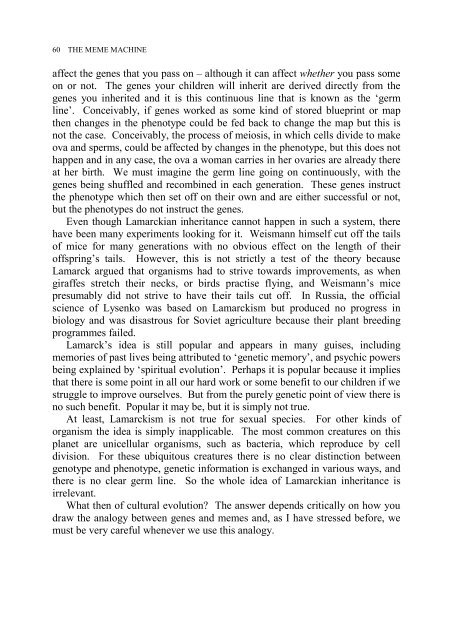The Meme Machine
TheMemeMachine1999
TheMemeMachine1999
- No tags were found...
You also want an ePaper? Increase the reach of your titles
YUMPU automatically turns print PDFs into web optimized ePapers that Google loves.
60 THE MEME MACHINE<br />
affect the genes that you pass on – although it can affect whether you pass some<br />
on or not. <strong>The</strong> genes your children will inherit are derived directly from the<br />
genes you inherited and it is this continuous line that is known as the ‘germ<br />
line’. Conceivably, if genes worked as some kind of stored blueprint or map<br />
then changes in the phenotype could be fed back to change the map but this is<br />
not the case. Conceivably, the process of meiosis, in which cells divide to make<br />
ova and sperms, could be affected by changes in the phenotype, but this does not<br />
happen and in any case, the ova a woman carries in her ovaries are already there<br />
at her birth. We must imagine the germ line going on continuously, with the<br />
genes being shuffled and recombined in each generation. <strong>The</strong>se genes instruct<br />
the phenotype which then set off on their own and are either successful or not,<br />
but the phenotypes do not instruct the genes.<br />
Even though Lamarckian inheritance cannot happen in such a system, there<br />
have been many experiments looking for it. Weismann himself cut off the tails<br />
of mice for many generations with no obvious effect on the length of their<br />
offspring’s tails. However, this is not strictly a test of the theory because<br />
Lamarck argued that organisms had to strive towards improvements, as when<br />
giraffes stretch their necks, or birds practise flying, and Weismann’s mice<br />
presumably did not strive to have their tails cut off. In Russia, the official<br />
science of Lysenko was based on Lamarckism but produced no progress in<br />
biology and was disastrous for Soviet agriculture because their plant breeding<br />
programmes failed.<br />
Lamarck’s idea is still popular and appears in many guises, including<br />
memories of past lives being attributed to ‘genetic memory’, and psychic powers<br />
being explained by ‘spiritual evolution’. Perhaps it is popular because it implies<br />
that there is some point in all our hard work or some benefit to our children if we<br />
struggle to improve ourselves. But from the purely genetic point of view there is<br />
no such benefit. Popular it may be, but it is simply not true.<br />
At least, Lamarckism is not true for sexual species. For other kinds of<br />
organism the idea is simply inapplicable. <strong>The</strong> most common creatures on this<br />
planet are unicellular organisms, such as bacteria, which reproduce by cell<br />
division. For these ubiquitous creatures there is no clear distinction between<br />
genotype and phenotype, genetic information is exchanged in various ways, and<br />
there is no clear germ line. So the whole idea of Lamarckian inheritance is<br />
irrelevant.<br />
What then of cultural evolution? <strong>The</strong> answer depends critically on how you<br />
draw the analogy between genes and memes and, as I have stressed before, we<br />
must be very careful whenever we use this analogy.



